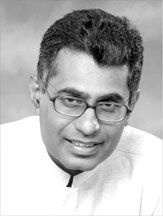Power sector financially sustainable, no subsidy needed - Minister
by Gamini WARUSHAMANA
Minister of Power and Energy Champika Ranawaka said that consumers
have to pay the true cost of electricity if they use units generated by
high cost thermal power plants. Announcing the new electricity tariff
structure which will be effective from January 01 he said that the new
tariff is based on “pay at the cost of units you consume”.
 According to the new structure there is no tariff increase for the
first 90 units. It introduces a tariff reduction for temples and
religious places, average cost tariff for non-profit making Government
institutions and tariff increase for the users who consume over 90
units. Accordingly hotels, factories and people who enjoy luxuries will
have to pay a higher price. According to the new structure there is no tariff increase for the
first 90 units. It introduces a tariff reduction for temples and
religious places, average cost tariff for non-profit making Government
institutions and tariff increase for the users who consume over 90
units. Accordingly hotels, factories and people who enjoy luxuries will
have to pay a higher price.
Under the new tariff structure the 30 percent fuel adjustment charge
has been removed. The minister said that according to the new tariff
policy the power sector will be financially sustainable and no subsidy
is needed from the Government. The objective is to provide basic
electricity at an affordable and fair price to the consumers and charge
the true cost of electricity from the consumers for their secondary
electricity needs with no subsidy. While charging high tariff from high
end consumers, hotels and commercial sectors special concessions will be
provided for small and medium scale industries. High end consumers too
have options to reduce their bills by saving energy.
Under the new system the unit rate is increased based on every 30
units consumed. Therefore a consumer who can save one unit per day can
reduce his bill.
The minister said that high end consumers also have options to shift
to alternative energy such as solar power. Some households have reduced
their bills significantly by using solar power, he said.
The new policy also targets energy conservation for 2000 large
industries which consume 80 percent of industrial power.
To reduce the peak load “time of use tariff” has been introduced for
industries. The objective is to shift their operations to off peak hours
of the day.
The policy also targets to encourage consumers to adopt aggressive
energy conservation measures through tariff for meeting future oil price
hikes.
According to the CEB the average unit cost of electricity (1Kwh) is
Rs. 14.95. However, the generation cost of a unit in some power plants
is around Rs. 47 per unit.
CEB can provide 72 units for each household per month from hydro
power and the first 90 units consists of this cheap electricity that is
owned by the people.
The ministry is also planning to increase the liquid natural gas
usage in the country.
Some high cost thermal power plants will be converted into LNG in the
future.
The minister said that LNG usage in the country is low compared to
other regional countries and Sri Lanka has missed this viable low cost
energy usage.
|

